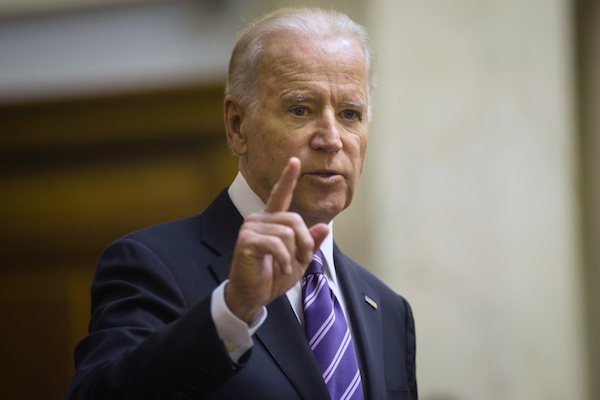It’s officially a new era in America, as Donald Trump’s presidency ended Wednesday, January 20 with the inauguration of Joe Biden as the nation’s 46th president. Among other issues, Biden inherits a heap of Trump administration actions perceived as unjust and problematic for the LGBTQ community.
“[Trump] was every bit as terrible for LGBTQ people as we predicted he would be,” says Sharita Gruberg, senior director for the LGBTQ Research and Communications Project at the Center for American Progress.
Several of the administration’s LGBTQ discriminatory actions—the Human Rights Campaign (HRC) offers a comprehensive list—can be sorted into two categories: cultural erasure (rollbacks on celebrations and visibility), and increasing opportunities for discrimination against people who identify as LGBTQ.
Cultural Erasure
Trump’s administration made several moves against queer visibility and celebrations.
For example, just days after Trump took office, nearly all mentions of the LGBTQ community were removed from the Department of State website, and a Department of Labor report on LGBTQ workers’ rights was also removed.
Additionally, in his first two years in office, Trump did not recognize June as Pride Month. In 2019, Trump seemed to change gears, acknowledging Pride Month and announcing a global initiative to decriminalize homosexuality. However, simultaneously, the State Department was reportedly forbidding U.S. embassies from flying pride flags on flagpoles, and the embassy in Jerusalem bowed to pressures from Jerusalem’s deputy mayor to remove its rainbow flag. In 2020, the embassy in South Korea followed suit, removing its pride and Black Lives Matter flags after local pressure.
“There’s definitely a dignitary harm that was caused by the administration,” says Gruberg. “To have your government not celebrate you [and even] actively attack and try to harm you because of who you are is not acceptable.”
Christy Mallory, legal director of the UCLA School of Law’s Williams Institute, notes research by her colleague Dr. Ilan Meyer proves stigmatizing laws and symbolic gestures impact victims’ mental health.
“The symbolic importance of certain things… can’t be understated,” says Mallory.
Expanding Institutional Opportunities for Discrimination
One of the earliest forms of the Trump administration’s LGBTQ regulatory discrimination was the final conscience rule to expand the breadth of health care workers who can invoke religion in the refusal to provide certain services. Introduced in 2018 as an update to a 2011 policy, the rule threatened LGBTQ services including gender reassignment and HIV treatment, among other services involving marginalized communities.
Similarly, in 2019, the Department of Labor proposed a rule to expand religious exemptions to discrimination laws for organizations that contract with the federal government. As Gruberg explains, it expands what religion means and what qualifies as a religious organization.
Neither rule explicitly mentions the LGBTQ community.
However, Ian Thompson, senior legislative representative of the American Civil Liberties Union (ACLU), says, regarding the final conscience rule, the Trump administration actually referenced a transgender man’s transition procedure as an example of why the rule was necessary, making its anti-LGBTQ intentions clear. Likewise, the Department of Labor policy is widely seen as definitively anti-LGBTQ.
Dr. Mike Friedman, a clinical psychologist who’s worked with LGBTQ patients and written about LGBTQ discrimination, says governmental actions like these—and like the transgender military ban—send a message.
“It’s saying ‘this isn’t your country, you can live in it, but…as a second-class citizen, and you should be happy about that; as long as you’re supportive of the majority culture, we’re okay,’” says Friedman. “That’s incredibly damaging to one’s self concept.”
Biden’s To-Do List
Biden has already begun undoing Trump administration actions. He’s issued several executive orders, including an order broadly prohibiting discrimination based on gender identity or sexual orientation. In addition, he recently announced that the transgender military ban would be lifted.
The ACLU next wants an executive order which makes it easier for transgender people to change their gender identity on government identification documents, and adds a non-binary/gender neutral option X to all documents. Twenty states, including Washington, D.C., have this ID system in place, according to Arli Christian, ACLU campaign strategist.
“When transgender people have an ID [with] the wrong gender marker, they’re subject to harassment and discrimination,” Christian explains. “They get unnecessarily questioned [and] sometimes experience violence.”
Christian says having accurate IDs alleviates that. Biden and Vice President Kamala Harris have already expressed support for the initiative, so the ACLU is optimistic.
Many members of the community would also like to see a speedy passage of the Equality Act, which specifies that sex, sexual orientation, and gender identity are included in the 1964 Civil Rights Act’s discrimination protections.
The Equality Act would protect LGBTQ rights from future hostile administrations because it supersedes presidential orders or federal regulations like what Trump’s administration issued. It would also counter what Gruberg considers a particularly significant, long-term Trump administration impact: the packing of the Supreme Court with anti-LGBTQ judges. With the Equality Act passed, the Court would have to rule on LGBTQ rights cases based on that, making LGBTQ discrimination concretely unlawful.
Overall, Gruberg and other advocates say Biden’s work on behalf of LGBTQ rights must go well beyond reversing the Trump administration’s actions, with an eye to not just repairing, but moving things forward further than ever.
“In 2021 it’s not enough to just go back to where we were at the end of 2016. The laws have changed, the needs of the [LGBTQ] community has changed,” says Gruberg. “We need a federal government that’s going to rise to that moment. I’m very heartened by what I’ve seen so far.”

